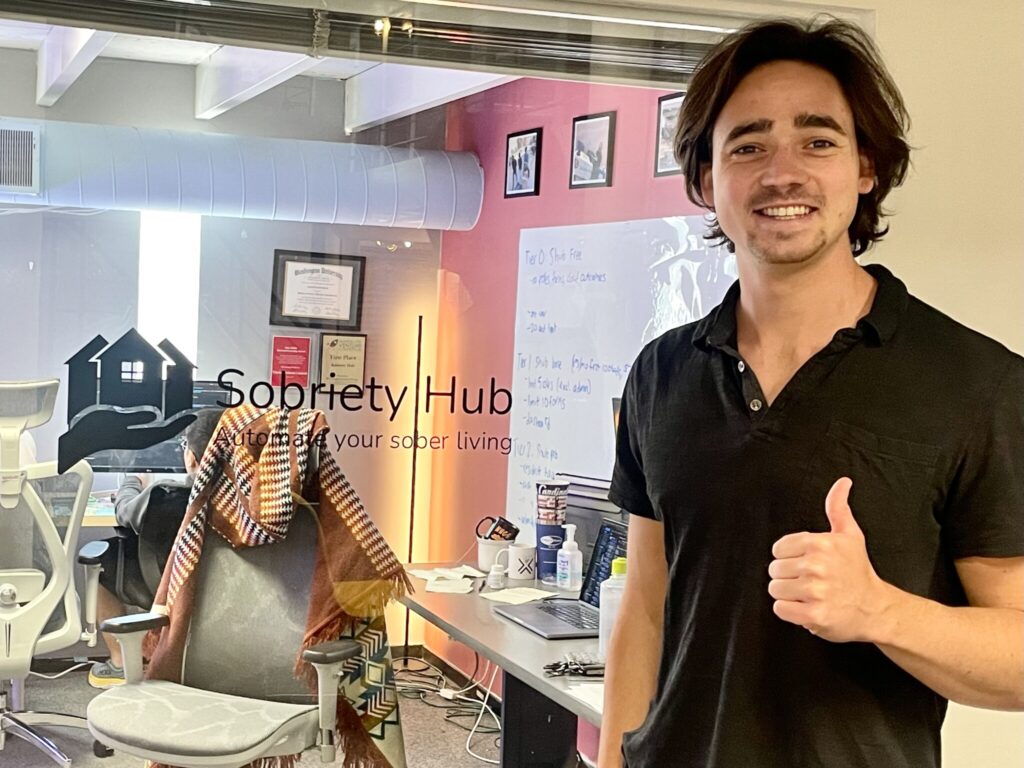The following article was published in the Fall, 2024 issue of CWEA Griffin. It was such a pleasure to interview Clay and learn about his app—and the story behind it. I hope you find it inspiring too.
To view the entire Fall issue, click here.
Chicago native Clay Canfield, co-founder of Sobriety Hub, came to St. Louis in 2017 to attend Washington University. He left two years later because of an addiction. “I wanted to get help, then I didn’t, then I did, then I did,” Canfield said. “There were lots of pieces that fell into place that enabled me to get sober, including my youth. Another was that I was able to get into a facility in California,” which Canfield describes as ‘the mecca of recovery.’
After completing the rehabilitation program, Canfield transitioned to a sober living home, which provides structured living conditions for people coming out of rehab. He was later asked to manage a different sober living home, a position he held for a year. That experience opened his eyes to the enormous need for a digital, standardized format so sober living home owners and operators could more easily manage their facilities and have client information readily accessible, instead of stuffed into file cabinets.
In 2021, Canfield was readmitted to Washington University. He returned to St. Louis with some trepidation, because of all that had happened here. He maintained his recovery and graduated from the business school two years later. That summer Canfield and a W. U. friend, Reilly Freret, who “happens to be a really talented software engineer,” formulated the idea for Sobriety Hub.
“We only had the summer to put the project together, since Freret was graduating and had a job in New York.” They had a shell of an app, but Canfield, who says his talent lies in recruiting really good engineers, knew he had to bring someone else onboard quickly. He connected with Joey Lanfersieck, another Wash U graduate, who had a degree in computer engineering, but knew nothing about coding.
Canfield had lined up an internship to support himself that summer, and Lanfersieck and Freret worked in his apartment for two months so the experienced coder could teach Lanfersieck everything he knew. In the meantime,Canfield was calling operators of sober living homes to find out what software they were using, if any, and what they needed to make their operations more efficient. The two programmers were creating the software as fast as they could, based on what Canfield learned on his calls.
As they were building the company, Lanfersieck became a co-founder, and Canfield was serendipitously able to recruit former U. S. Representative Patrick Kennedy as an advisor. Canfield enrolled in a class where venture capitalist Joshua Rahn was among the speakers. He was able to follow up with Rahn, and through a round-about connection enlist Kennedy, an advocate for addiction recovery.
“Sobriety Hub, Automate your Sober Living” was up and running in the Fall of 2023, but “It’s never finished,” Canfield explained. “There are always new components to add as we get feedback from customers.” The LLC is located in the CWE’s TechArtista, where programmers, Andrew Carpenter, whom Canfield describes as our “secret weapon”—and an intern provided by Washington University—work on refining the site and building features that are specific to their customers needs.
Currently, over 100 sober living homes across the country are using the Sobriety Hub app. The cost is $5 per month per client. The first sober living home to sign up was Hilljack House, which operates 5 sober living homes, 3 for 21 women, and 2 for 17 men in St. Louis..
Hilljack House was founded in 1997 by a group of people who were sober and wanted to give back, which Canfield explained is how most of the thousands of sober living homes across the U.S. were created. Executive Director Dawn Smith said these homes rely on private donations, fundraising, and residents to cover the cost. The typical sober living home resident pays $650 to $800 a month, Canfield said. An atypical scenario is in Malibu, where residents might pay as much as $40,000 a month.
Hilljack House receives no assistance from the government, Smith said. 80% of their clients come in unemployed, and they help them find work. Today, 100% are employed, she said. What attracted her to the Sobriety Hub app was the simplicity of it. “I had been seeking a program that was tailored to our specific needs for several years, and Sobriety Hub was it. The app allowed us to go completely paperless, and also gave us the ability to track data effortlessly.”
Canfield said that if more homes sign up to Sobriety Hub for a long enough period of time they can analyze the data and produce valuable information that would be helpful for all sorts of treatment centers’ programs and grant applications. “We could find out what recovery programs work for what kind of people. Part of what a client signs up for in a sober living home is drug testing, which is logged. So, for instance, they could look at people who are under 30 in a certain geography, track lengths of stay and recovery under a 12-step program. These are the things nobody really knows, but the answers are in our data set, it’s just not large enough, or been operating long enough.”
Canfield hopes that Sobriety Hub becomes both the go-to solution for recovery homes nationwide and the gold-standard solution for managing sober living homes. “We want to work with every home of every size and price range,” he said, “to help automate sober living homes and enable them to spend less time on administration and more time with residents one-on-one.”
For more information, visit the website, sobrietyhub.com.

Great article Nicki! Wonderful work Clay. Thank you for what you are doing for our community and society as a whole. Arthur